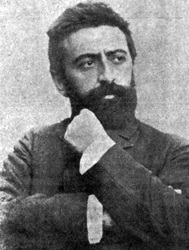 Arpiar Arpiarian was not only an influential Armenian writer of the nineteenth century, but also the pioneer of realism in Armenian literature, and, as many of his pioneer, a political activist, to which he ultimately sacrificed his life.
Arpiar Arpiarian was not only an influential Armenian writer of the nineteenth century, but also the pioneer of realism in Armenian literature, and, as many of his pioneer, a political activist, to which he ultimately sacrificed his life.Arpiarian was born aboard a ship. His parents, who were originally from Akn (an Armenian town near the Euphrates River where noted poets like Siamanto and Misak Medzarents were born), were traveling from the Black Sea port of Samsun to Constantinople. The family settled in the suburb of Ortakiugh (Ortaköy), where Arpiarian attended the local Tarkmanchats Armenian School. At the age of fifteen, he was sent to Venice, where he attended the Murat-Raphaelian school of the Mekhitarist Congregation. He studied Armenian language and history with the famous Mekhitarist poet and scholar Ghevont Alishan, and he also became familiar with French and Italian literature.
After his graduation from the school, he returned to Constantinople, where he worked as a bookkeeper and then was offered a secretarial position at the Armenian Patriarchate. However, his true call was journalism and literature.
He started contributing to the newspapers Masis, in Constantinople, and Mshak, in Tiflis. He wrote articles flavored with satire in the latter, under a pen name, about various aspects of Armenian life in Constantinople. He visited the Caucasus in 1884 on the election of Catholicos Makar I and met Grigor Artzruni, the influential editor of Mshak, as well as several famous writers, like Raffi, Perch Proshian, Ghazaros Aghayan, and others. This visit left a lasting impact on his life and outlook. He later became an editor of Masis, along with famous writer and politician Krikor Zohrab. Simultaneously, he launched a daily called Arevelk with the aim of promoting closer links between Western and Eastern Armenians.
Arevelk attracted many writers who became the core of literary realism among Armenians. Arpiarian is considered the founder of that literary movement, which revolutionized Armenian literature. He was the mentor of a generation of Armenian realist writers, such as Dikran Gamsaragan (1866-1940), Levon Pashalian (1868-1943), and, later, Yerukhan (1870-1915).
Politics had already attracted Arpiarian since the early 1880s, and in 1889 he joined the Social Democrat Hunchakian Party, of which he would become one of its main leaders. He was among the chief organizers of the Kum Kapu demonstration in light of Sultan Abdul Hamid II’s treatment of Armenians. Arrested as a revolutionary, he was released in 1891. In that year, he founded and edited a new and very influential daily, Hairenik, which was suppressed by the sultan in 1896.
Arpiarian fled the Hamidian massacres in 1896 to London, where he published two monthly reviews, Mard and Nor Gyank, in the next few years. In the same year, the fracture of the Hunchakian Party began as a result of ideological dissent. He led one of the split factions, the Reorganized Hunchakians (Veragazmial Hunchakian), which rejected the socialist ideology of the party and eventually left it. Bitter partisan quarrels would continue over the next years and Arpiarian would make many enemies among his former comrades.
He traveled to Paris and then to Venice in 1901-1902. In the Italian city, he wrote his most successful and popular work, the novella The Crimson Offering (Կարմիր ժամուց), where he depicted the opposition between the revolutionary youth of the provinces, symbolized by a priest, Der Housig, and the conservative stance of the Armenians of Constantinople, represented by Hairabed Efendi, a trustee of the church where the priest had been called to serve. Arpiarian settled in Cairo three years later, where he edited the literary monthly Shirag.
On February 12, 1908, his political enemies assassinated him while Arpiarian was returning home from the market. His last words were “I am Armenian.” Writing after his death, poet and political activist Vahan Tekeyan (1878-1945) noted: “There were two people inside him, the patriot and the skeptic. The first killed him.”
However, Arpiarian’s name has continued to resonate in Armenian literature more than a hundred years after his death.